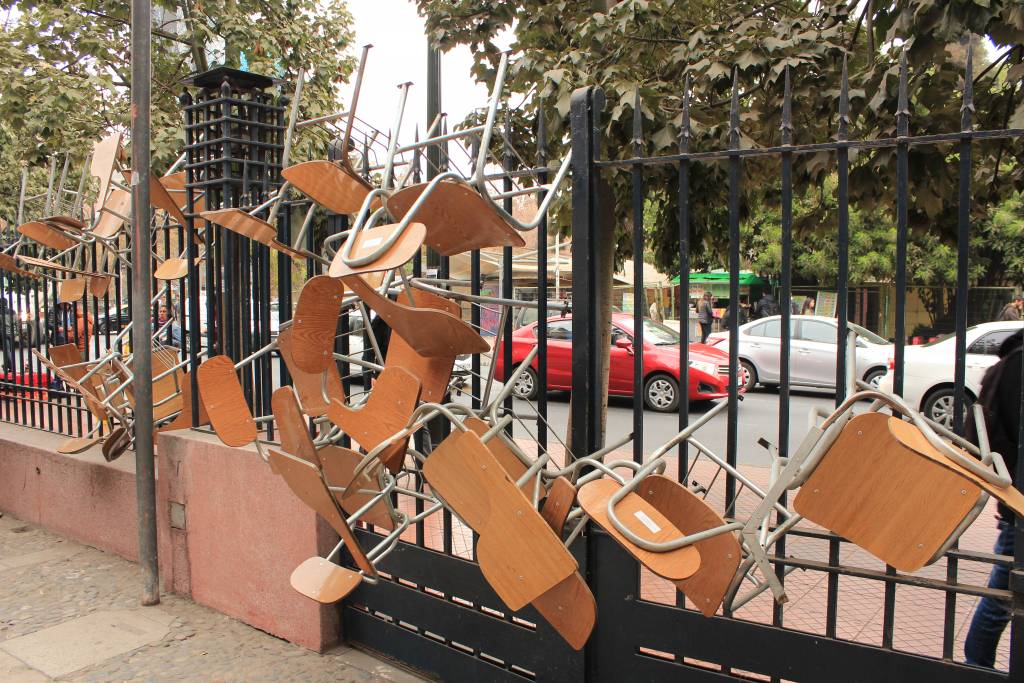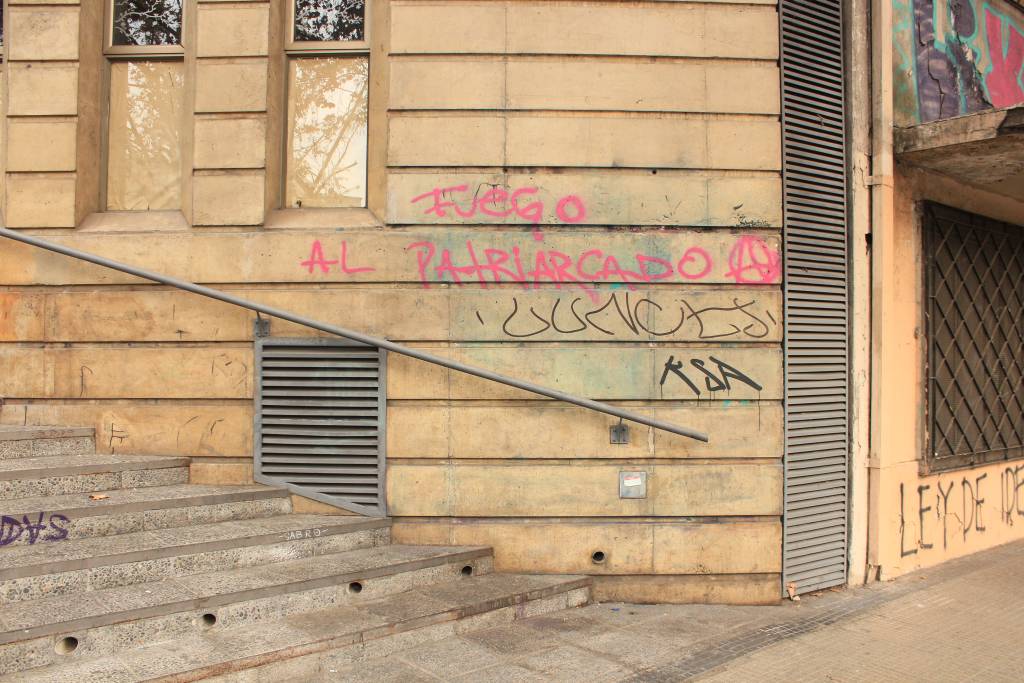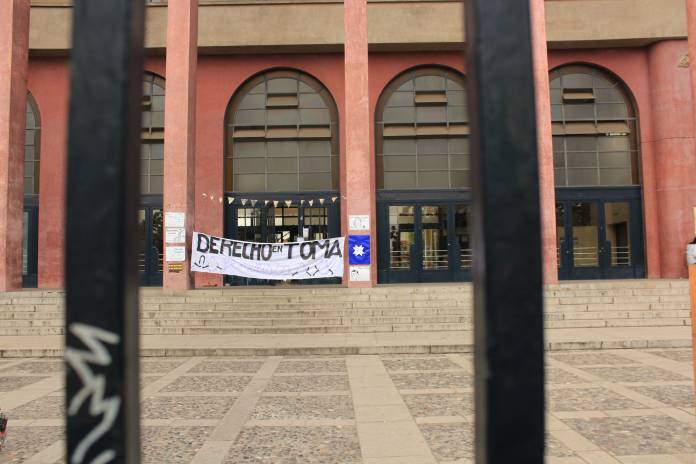LETTER FROM CHILE Our friends were late to meet us at an art opening on May 11th in Santiago, Chile. They had a good reason; thousands of feminist protesters had taken the streets. Even after their march had ended, everywhere you looked women were passing quickly in pairs and trios, faces painted, clutching signs. They ducked down briefly besides walls and street barriers, leaving inflammatory stencil art in their wake. That tightening you feel when mass gatherings hover on the brink of losing control was palpable and in an attempt to maintain control, officials shut down some entrances to the subway in central neighborhoods during Friday night rush hour.
Later, videos would emerge from the march that had taken place earlier in the day on La Alameda, Santiago’s central avenue. One contingent was shirtless, their faces covered in maroon balaclavas. They swayed low to the ground, their fists rising in synchronicity. The United States Women’s March this was not.
They chanted:
Y como y como (And how and how)
Como es la wea ? (How is this thing?)
Nos matan y nos violan (They kill us and they rape us)
Y nadie hace nada (And no one does anything)
Forty years after the United States-funded Pinochet military regime smashed the socialist idealism of the democratically-elected President Salvador Allende, the country is deeply divided. While many Chileans fight for government recognition of the regime’s 1,000 detention and torture centers, dictatorship apologist Felipe Kast accrued 15.4% of the vote in last year’s presidential elections despite being the grandson of an actual German Nazi. The water supply, privatized under Pinochet, is rationed at the whim of corporations. In Southern Chile, the Mapuche people were among the Americas’ only tribes never to submit to colonial regime. But reminiscent of the tactics of Pinochet’s repressive DINA police forces, activists protesting the region’s rapacious foresting companies are disappeared. Abortion in the case of rape or probable lethality for the mother or fetus was legalized just last year. In all other cases, a person who chooses to terminate their pregnancy can be sentenced to up 10 years in jail, their doctor up to 15.
Chileans have little to fall back on besides their talent for protest, and it is far from limited to marches. The May 11 demonstrations were merely an exclamation point, a show of support for something even more radical currently sweeping the country, something that could bring long-awaited justice for Chilean women.

To date, 14 university and two high school campuses in Chile have been occupied by feminist students spurred to action by a rash of unanswered sexual assault and harassment denunciations in university communities. Prior campus occupations carried out by Chile’s thriving student movement and last year’s feminist takeover of Valdivia’s Universidad Austral serve as precedent. This current wave of activism started on April 27th when a coalition announced to authorities that they were seizing command of the University of Chile’s School of Law.
The revolution has arrived! I presented myself at the front gate credentials check at the School of Law, ground zero for the new wave of feminist radicalism. The day I arrived, the front door was staffed by a team of men. Unlike some of the separatist occupations that have launched since their initial takeover, the School of Law’s moment is gender-inclusive. Men can play roles in the coalition, though they are barred from being spokespeople.
I was there to meet 21-year-old, fourth year law student Emilia Schneider, one of the occupation’s spokespeople. She took a moment’s break from a day of strategy meetings to speak with me about the incredible moment of defiance in which she and her peers find themselves. We found a place to talk in a corridor of quiet classrooms, where the verses of radical Chilean rapper Ana Tijoux and folk music broke the calm thanks to the students’ sound system installed in the campus courtyard.
My first questions were about logistics. I wanted to know just how one shuts down a campus.
Schneider told me that her campus has been occupied by student protest every year since she matriculated. This current shutdown came about when 600 School of Law students convened for a meeting at the campus student center. “We were looking to understand the situation,” said Schneider. She asserted that the meeting was not about any case specifically, but instead a general sense that things needed to change when it came to the way gender-based violence was dealt with on campus. (Since then, demands have expanded to include gender parity in curriculums. “Feminist public education is not a secondary issue, not an accessory issue, but an essential issue of how we approach radical educational transformation,” said Schneider.)

On April 27th, a decision was reached that a campus takeover was necessary. As spokesperson, Schneider stayed with the meeting, chanting and leading others to grab chairs to wedge in the school’s front gates as a symbol that the occupation had begun. Representatives went to the administrative offices, informing the authorities that the School of Law was now under feminist control.
Earlier this month, school administrators put out a memo calling on the students to cede their control of the campus. “The continuation of the occupation of the school properties is not an ideal way to condition the final result of the legal remedies that will be put in place,” it affirmed. Days earlier, professors delivered a signed letter of support for the movement.
Their vote of confidence multiplied. First, the strikes and occupations were limited to other University of Chile campuses; the School of Government and Public Management, then Social Sciences, then Architecture and Urbanism. But soon other campuses joined in in strikes and occupations — even a school in Iquique, a town some 2,000 kilometers north of Santiago. Walking around the capital today, you are likely to see lists of demands posted to university doorways and endless feminist graffiti. (A personal favorite: “A(r)mate” written alongside the Venus symbol.)
On the School of Law campus, students staff the occupation 24 hours a day. Visitors must sign in before entering, and accused sexual predators are denied access on the basis of maintaining a safe space. Periodically, the coalition holds votes open to the student body to revalidate the occupation — they are working on technology so that people can register their vote online. Drinking is strictly prohibited. It’s not all work; theater and music groups have been invited to perform for the occupation.
Schneider was careful to locate these efforts in a larger historical struggle. “The feminist movement has existed for a long time in Chile,” she said, citing the work of Chilean sociologist, gender studies pioneer, and ardent socialist Juliet Kirkwood. “The problem is it goes through silences, and this silence was a prolonged one.”
At the start of new action, new levels of organization are necessary. Where Schneider’s contingent initially expected to negotiate their demands with School of Law officials, unexpected levels of solidarity impel them to think now on a grander scale. There are plans to unite with representatives from the other occupations and take their issues to national authorities. “We’re going to sit down to dialogue with authorities of our universities departments, with the universities, with rectors, with the Minister of Education, with the Minister of Women,” she told me. As a result of these strategic uncertainties, Schneider said that she expects the occupation to last for quite some time.
They have the attention of the country, and I hope the world will also be watching to see what is accomplished from these strikes, to see what women and their allies can do in the face of injustice. “It’s a historic accumulation of what has happened,” Schneider said. “We haven’t invented anything, we are a part of history.”
Muchas gracias a Chile y a Michele Threadquist por su ayuda con ese artículo.








